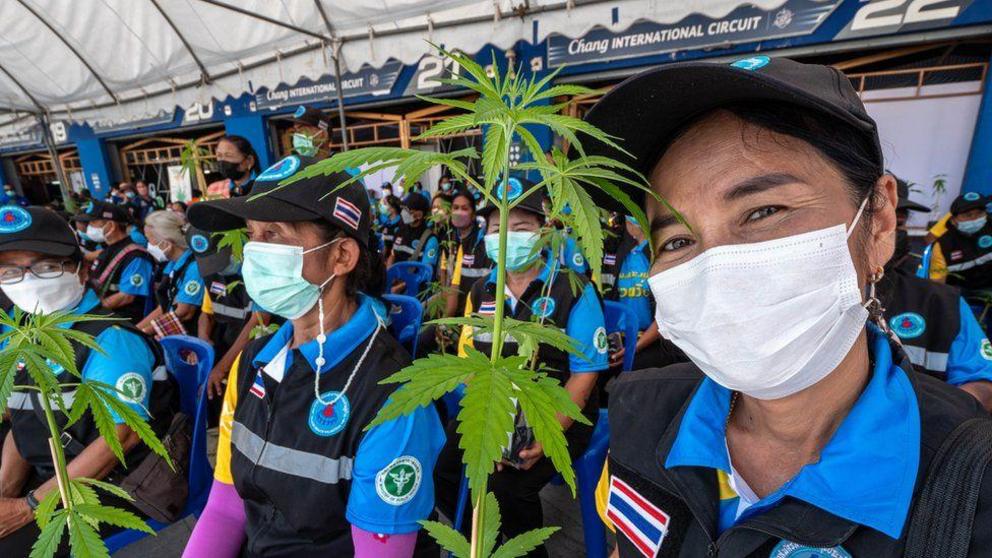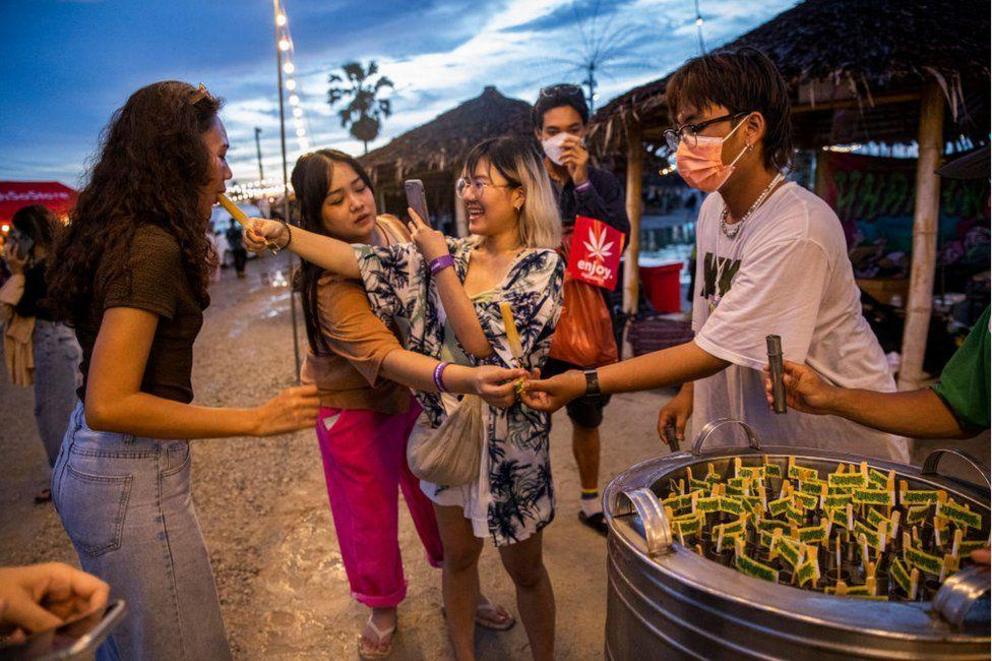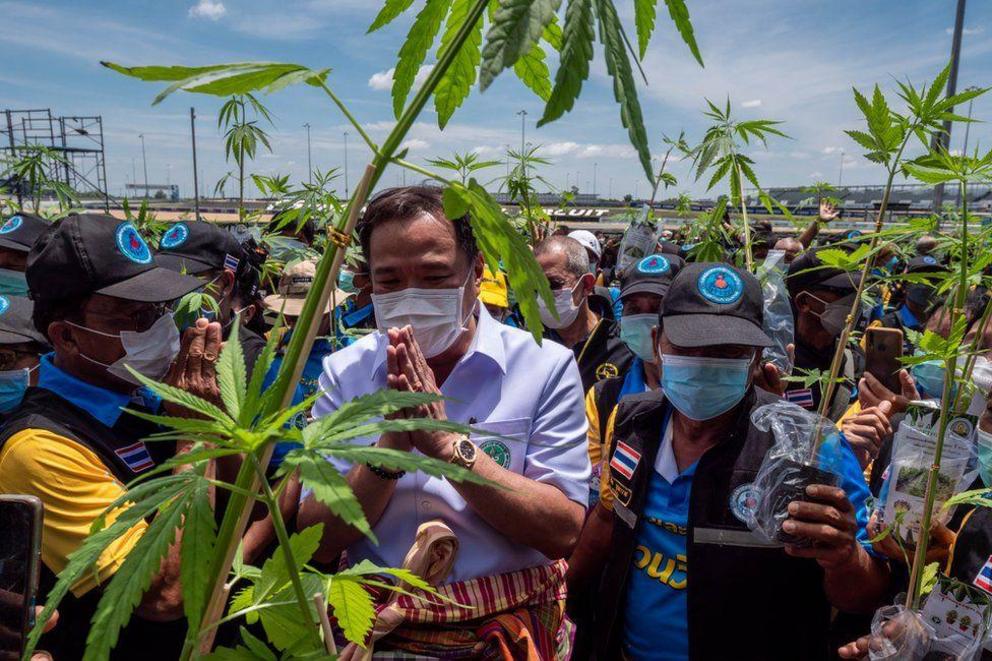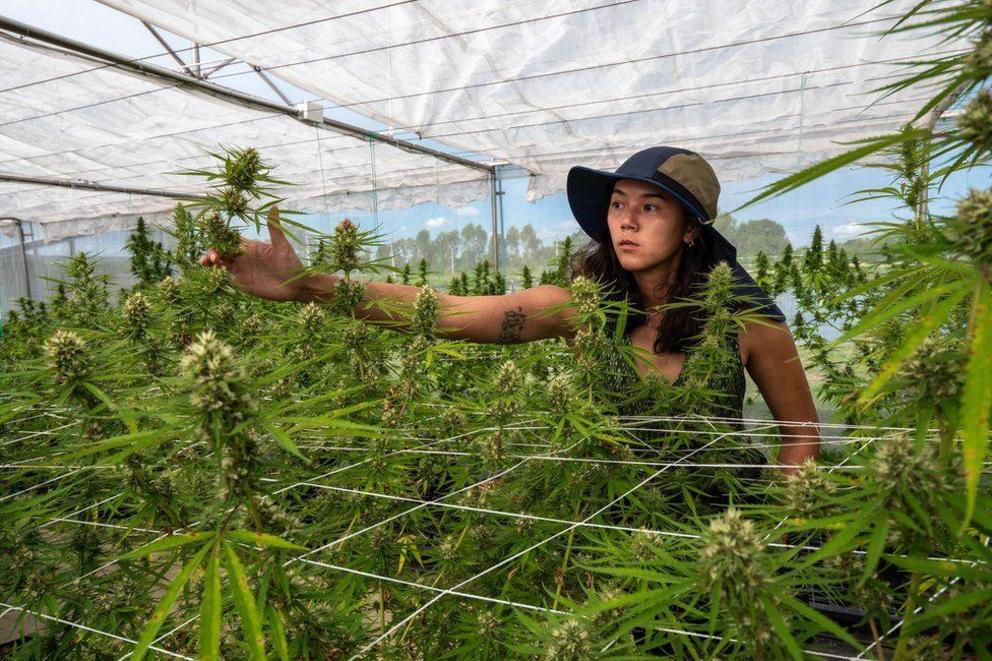Thailand cannabis: From a war on drugs to weed curries
Thailand legalised cultivating and consuming cannabis this month, reversing a hard-line approach of long prison sentences or even the death penalty for drug offences. The BBC's South East Asia correspondent Jonathan Head reports on what's behind the dramatic change.
 Thailand has given away one million cannabis plants to encourage cultivation
Thailand has given away one million cannabis plants to encourage cultivation
Twenty-one years ago, I had one of the more searing experiences of my journalistic career. We were invited to watch, and film, the execution of five prisoners, four of them convicted drug traffickers, by firing squad in Bangkok's Bangkwan prison.
The look on those men's faces, as they were walked, leg-chains clinking, to the pavilion where the executions took place, is something I shall never forget.
It was part of then prime minister Thaksin Shinawatra's "war on drugs", which later escalated into the killing of many hundreds of drug suspects.
Thaksin's campaign was popular. Thais were worried about the damaging effects on their communities of narcotics like methamphetamines - and they were willing to ignore the shocking violations of human rights that came with the violent crackdown.
Other countries in the region have followed the same punitive approach, notably the Philippines after President Rodrigo Duterte took office in 2016. Singapore and Malaysia have imposed the death penalty for drug trafficking for decades. Tourists coming to South East Asia have long been warned of the harsh penalties they face if caught with even small amounts of marijuana.
It's hard to imagine, then, that what we have seen over the past weeks is actually happening in Thailand.
Cafés and stalls have been openly selling all kinds of cannabis products, or showing off jars filled with potent marijuana flowers. The minister for public health, Anutin Charnvirakul - architect of the new law, which now gives Thailand perhaps the most liberal marijuana regime anywhere in the world - was seen sampling weed-laced curries, and being applauded by farmers who hope it will bring them new sources of income.
There were gaggles of giggling Thai grannies trying lurid-green cannabis drinks, and lining up to collect one of the million free marijuana plants the government is handing out.
 A festival celebrating the new law offered people weed-laced popsicles. Image source, Getty Images
A festival celebrating the new law offered people weed-laced popsicles. Image source, Getty Images
The new law appears to give Thailand what is perhaps the most liberal approach to marijuana anywhere in the world. For the moment, people can grow and consume as much of the plant as they like, though there are a few limits on how they can market and sell it.
"One thing is clear. You cannot go to jail in Thailand just for using cannabis any more," says Tom Kruesopon, a pioneering entrepreneur who helped persuade the government to change its approach. "You can go to jail for doing other things, like smoking in public, as a public nuisance, or creating and selling a product from cannabis that you did not get approval for from the Food and Drug Administration. But Thailand is the first country in the world where you cannot go to jail for growing or using the plant."
"This is like a dream for us. We never thought we would go this far in Thailand," says Rattapon Sanrak, who began campaigning for legalisation of marijuana after experiencing its medical benefits while studying in the United States.
Two grandparents, his father and then his mother died from cancer. On rushing back from the US to care for his mother, he tried, and failed, to persuade her to use cannabis products to ease her pain, and found it difficult to get access to what were then illegal substances.
What explains this dramatic turnaround in a country still led by conservative military men who seem unlikely drug law liberalisers?
Part of the reason is politics. Mr Anutin adopted the legalisation of marijuana as his party's signature policy in the 2019 election. The party's stronghold is in Thailand's poor, rural north-east, and the policy appealed to farmers struggling to make a living from growing rice and sugar, and in need of a new cash crop.
So, he was able to tell the cheering crowds, as he announced the new law in his political home base of Buriram earlier this month, that he had delivered what he had promised. He believes in the medical benefits of legalisation, which he hopes will allow poorer Thais to grow their own treatments, rather than having to pay for expensive chemical drugs.
 Health minister Anutin Charnvirakul has been one of law's biggest supporters
Health minister Anutin Charnvirakul has been one of law's biggest supporters
It is also about business. Mr Kruesopon estimates the marijuana business will generate $10bn (£8.1bn) in its first three years, but could earn a lot more from cannabis tourism, where people come to Thailand specifically for therapies and treatments using marijuana extracts.
He has opened the first clinic in Bangkok that focuses solely on these kinds of treatments. Already some of Thailand's biggest corporations are looking at ways in which they can cash in on the weed bonanza.
By liberalising the law so quickly and so completely, the government hopes to steal a march on neighbouring countries, many of which may in any case be reluctant to follow the trail blazed by Thailand.
But there is a third factor behind the new marijuana regime - a rethinking of the hard-line approach to drug use, which began seven years ago, surprisingly at a time when Thailand was ruled by a military junta.
The country has some of the world's most overcrowded prisons, and three-quarters of inmates are there for drug offences, many of them minor. This has not only brought international criticism of the poor conditions in which prisoners have to live, but also cost the government money to sustain them.
It was a military minister of justice, General Paiboon Kumchaya, who announced in 2016 that the war on drugs had failed, and another, less punitive method of dealing with the use and abuse of narcotics was needed.
When Mr Anutin presented his marijuana policy, with all its enticing economic benefits, he found he was pushing at a relatively open door - though he says it still took a great deal of pushing to get this far. One other result of the change in the law is that more than 4,000 people on cannabis-related charges are now being freed from jail.
However, the government may not have been prepared for the enthusiastic embrace of cannabis in all its forms seen across Thailand since the new law was passed.
The plant is showing up everywhere - on ice cream, adorning classic Thai dishes and in new smoothie recipes. Someone is even selling chicken meat from birds which have apparently been fed cannabis. The new law makes pretty much anything related to cannabis legal.
The government is now drafting additional regulations over its use. Officially its position is that the law only allows cannabis use for medical, not recreational purposes, but it's hard to see how they will enforce that distinction.
 Chidchanok Chidchob tends to her marijuana plants in Buriram
Chidchanok Chidchob tends to her marijuana plants in Buriram
"We all know from studying other markets that recreational use is where the money's at," says Chidchanok Chitchob, a self-styled marijuana enthusiast whose father, a powerful political figure in Buriram, was one of the first to jump on the Thai marijuana bandwagon. "So I think this should be a good step towards that, if we are really thinking of this as an economic crop."
She is experimenting with different strains of the plant to help local farmers cultivate the right kinds for the region.
Mr Kruesopon says he has no issue with further regulation. He advocates sales of marijuana only from licensed vendors, with a prescription, and never to anyone under 18 years old.
"You don't have to overthink this," he adds. "Whatever you are using for cigarettes, use the same thing for cannabis. There are already laws on the books to help control cigarette use, and alcoholic liquor use - just use the same laws."
This is an uncharacteristically bold step by the Thai government, into a brave new world. The rest of the region will be watching to see if it pays off.
